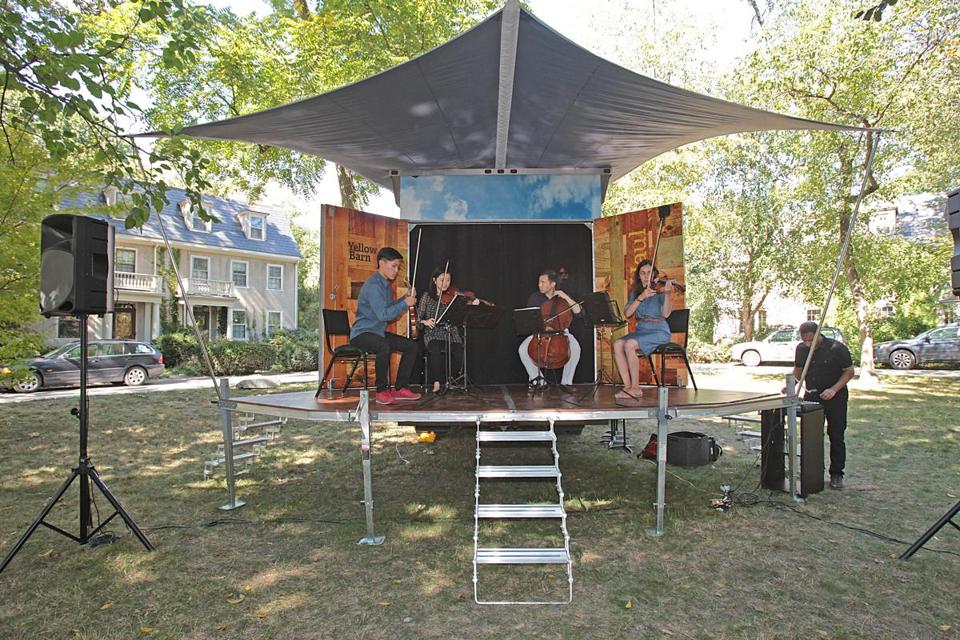Malcolm Gay, staff writer for The Boston Globe, introduces Yellow Barn Music Haul in advance of the 2016 Boston tour:

On a stage that unspooled from a converted U-Haul, the Grammy Award-winning Parker Quartet rehearsed in Cambridge Friday.
The 17-foot U-Haul truck sat parked in an empty field, ringed by trees. With the touch of a button, a roof-mounted winch whirred into action, unspooling cable as a fan-shaped stage lowered like a drawbridge from the rear. The U-Haul’s modified rear doors acted as a band shell, flanking the stage to project sound, and a custom-made sail, supported by deep-sea fishing rods, projected as a visor from above.
Fifteen minutes later and the vehicle, dubbed the Music Haul, was a fully functioning stage — a 21st-century gypsy caravan that will bring live performances to the streets and schools of Greater Boston, Sunday through Tuesday.
“It really is more boat than truck,” said Catherine Stephan, executive director of the Yellow Barn music center. “We got to know RV dealerships really well.”
The musical equivalent of a food truck, Music Haul is the brainchild of Yellow Barn, an acclaimed center for chamber music tucked away in the hills of southeastern Vermont.
“It’s supposed to be as close to magic as possible,” said architect John Rossi, one of the traveling venue’s principal designers. “As much as we could take a U-Haul truck and make its transformation seem effortless and smooth, and actually even beautiful, that’s what we wanted to do.”
“We exist in the world as musicians that is in a way so finely controlled and tuned,” said Yellow Barn’s artistic director, Seth Knopp. “Music Haul removes some of the ceremony, which can be a barrier for people who are not often exposed to that world. There’s an element of taking something out of its accustomed place and allowing it to take people by surprise.”
After a pit stop in New Hampshire, the Music Haul spent Friday in Cambridge, where the Grammy Award-winning Parker Quartet used its stage to rehearse Schubert’s devilish Quartet in G Major before the Boston tour kicks off Sunday with concerts scheduled in the South End, Dorchester, and Christopher Columbus Waterfront Park. Later stops include performances at Harvard Square and the State House.
The tour is built around performances at three area schools, where Yellow Barn alumni musicians will perform from the six-person stage as students arrive in the morning, and they will give presentations during recess.
“They’re on their playground,” said Stephan, who added that the kids can decide whether they participate. “They can go play if they want to...and because they all choose to be there you’ve got their attention.”
Yellow Barn alumni will also take the stage at other venues around town, providing open-mic-style performances that include a range of classical music and jazz, with pieces by Claude Debussy, Felix Mendelssohn, György Ligeti, and Iannis Xenakis.
“It’s almost like a microcosm of Yellow Barn,” said Daniel Chong, first violinist in the Parker Quartet. “It’s the care and love for great music and performers, and delivering them to people in a way that’s both surprising and engaging.”
Founded in 1969 by cellist David Wells and his wife, pianist Janet Wells, Yellow Barn hosts scores of musicians each summer at its Vermont campus, where they practice, share ideas, and perform about 20 concerts over a five-week season at their primary music hall, Big Barn, in Putney. The music center, which shares a campus with the Greenwood School, also offers artist residencies and a young artists program.
Stephan said the Music Haul was an extension of Yellow Barn’s founding ethos.
“The mission is the same,” she said, adding that the $90,000 project was paid for in part by a Fresh Sound Foundation grant. “Either you know something about the music walking in, or you don’t. Either way, we want to give people a different type of experience.”
In designing the Music Haul, Rossi and his team divided the truck’s storage area into two parts, transforming the fore section into a greenroom with windows, seating for six, and a table, while the aft portion stores instruments and lighting, converting to a curtained area during performances.
“The truck becomes the backstage,” said Rossi, who worked on the project with boat designer Bill Lincoln. “The drive has always been to simplify, simplify, simplify.”
Rossi, whose business, Visible Good, designs crates that unfold to become emergency relief structures for disaster areas, said Music Haul shares certain design elements with his boxed buildings, which are known as Rapid Deployment Modules.
“The crazy little disaster-relief military medical shelter is the thing that probably had the most influence on this, versus any architecture with a capital ‘A,’ ” Rossi said.
Knopp said when it comes to Music Haul, which is also equipped with marine speakers to blast Yellow Barn recordings en route, a key element is in the wonderment afforded by surprise.
“Because it’s unexpected, people will not have preconceptions, and they won’t feel the fear of ignorance in the face of an experience they’ve never had before,” he said. “Without that expectation, you have a kind of vulnerability, an openness, that one needs to listen in the best possible way.”
